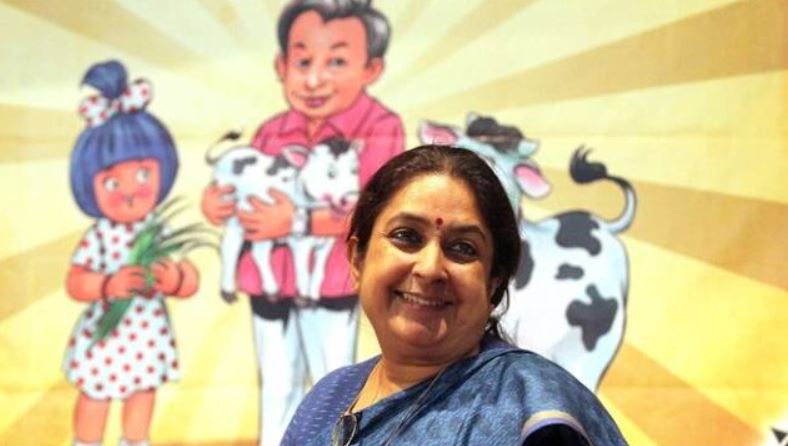Nirmala Kurien, 63, is best known for being the daughter of Verghese Kurien, but she’s a remarkable personality in her own right. A divorcee and a single parent, Ms Kurien built an independent career in Chennai, to support herself and her son Siddharth. She is currently General Manager, Human Resources, at Sankara Nethralaya eye hospital.
Ms Kurien has curated a book on her late father, which was released on his birth centenary last month. ‘The Utterly Butterly Milkman’ features writings from an eclectic set of people who worked with Dr Kurien (aka Jolly to his friends) and knew him well. In an exclusive telephonic interview with VO! From Chennai, Nirmala Kurien talks about the perils of book editing, Star Trek and her long battle for the custody of her son.
VO!: How was the experience of curating this book?
NK: It was cathartic. I was at a loss ever since I lost both my parents in quick succession in 2012. This helped me come to terms with it. I invited 75 people to contribute and nearly all of them responded. Reading what they had written was amazing. It gave me fresh insights into my parent’s lives, why they decided to stay on in Anand through the early years despite all the hardship.
VO!: Did you have to censor some of the pieces?
NK: I had to edit a lot, but I didn’t censor. People who have worked with him have said he was sometimes rude as a manager, that he was intolerant of those who didn’t believe in the cooperative movement. That’s all in the book. I put no limit on the word count when I invited articles, which was a mistake since some people submitted really long pieces. Bruce Scholten (author of ‘India’s White Revolution’) sent a thesis! I had originally planned for the book to have 150 pages. We finally ended up with 328 pages. After editing, 60% of what appears in the book is new material which hasn’t appeared in print.
VO!: Some of the pieces lack insight. Adi Godrej, Kiran Mazumdar-Shaw…
NK: I thought Adi Godrej was on a committee with my father, so I invited him to contribute. Once he sent the piece, it would have been rude of me not to include it. Kiran had told me she was a great fan of my father and wanted a selfie with him, so I thought to invite her. I asked people to write personal stories, anecdotes, but everyone couldn’t do that. Some have analysed Operation Flood. Then there are people from the extended family who now call me to ask ‘Why wasn’t I invited to write?’ I wanted to keep the family section limited.
VO!: You didn’t invite Amrita Patel, who took over as NDDB chairman after your father?
NK: I didn’t want her in the book. I did not appreciate what she did to my father. She wasn’t a part of the birth centenary celebrations.
VO!: You’ve written about how your father loved gossip magazines like Stardust. Who was his favourite heroine?
NK: He enjoyed the gossip, but he didn’t watch Hindi films. But he was very proud of producing ‘Manthan.’ Shyam Benegal, the director, has written a wonderful piece in the book. I remember my father used to watch Star Trek on TV on Sundays, totally rapt, we weren’t allowed to disturb him. I regret I never kept a diary. There’s so much I’ve forgotten.
VO!: Tell us about your own career.
NK: I’ve had a 36-year career in Human Resources (HR) management. After graduating from MS University, I started my career in Bank of Baroda. Then I went to The Tavistock Institute in London for an advanced degree. After my divorce in 1994, I stayed with my parents for two years. It took time to get used to my new circumstances. I was a single parent. But getting a job in Anand was impossible. My father wouldn’t take me in Amul or any other institution he was associated with. I said I needed to leave, go elsewhere. He said he couldn’t support two households. I told him I would support myself. I moved to Chennai, where an aunt had a house. I stayed on the ground floor and her son stayed on the first floor. My first job in Chennai was with a small company, on a salary of Rs 7,000 a month. After that, I worked in the HR department of several organisations, including the Taj Coromandel Hotel. All through this period, I was waging court battles for the custody of my son, Siddharth.
VO!: What went wrong with your marriage?
NK: We came from different worlds. I don’t want to say anything against him because I want my son to respect his father. Our main contention was over custody of our son, who was five years old when we separated. The court battle went on for 11 years, in Kheda, Vadodara, Ahmedabad. I had to approach the Supreme Court to get it shifted to Chennai. It was tough but it helped me grow as a person. Being a single parent is hard. I’m just glad Siddharth has turned out to be such a fine young man. He has recently gone back to studying. He’s doing his MBA at IIM Kozhikode.
VO!: He’s written a piece in The Utterly Butterly Milkman…
NK: And it’s my favourite part of the book.













The Milky Way
I can relate with the article as my first job was with Gujarat Cooperative Milk Marketing Federation, Anand and Ahmedabad.
Very well conducted and written.